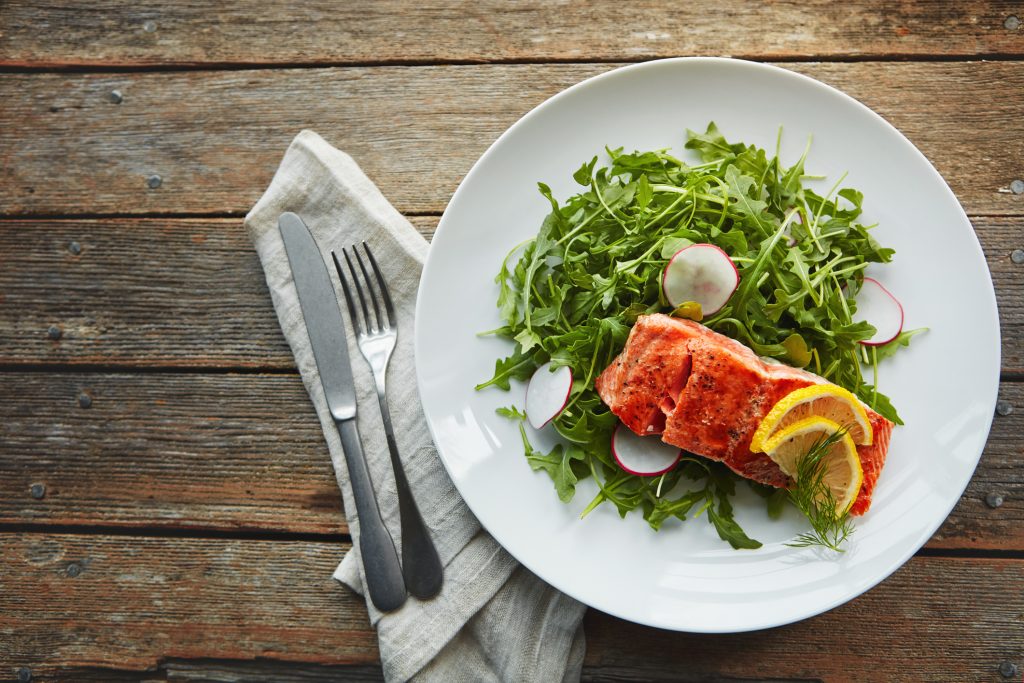Brain Food

Our brains make us human. This complex 3-pound organ enables us to see, smell, touch, feel, express, remember, interact with, and connect to the world around us. It is made up of 100 billion neurons (nerve cells) which form 1 million new connections every second. Neurons are connected to other neurons by up to 40,000 individual synaptic connections. This means there are more connections in our brain than stars in the universe. Think about that for a minute. The brain and its unfathomable number of connections requires so much energy to function that it uses 20% of the oxygen we breathe and 20% of the calories we consume. On average, your arteries supply 20-25% of your blood to the brain and if you are using more brain power by thinking, learning a new skill, or concentrating very hard, it can require up to 50%!
This is truly beyond comprehension. When I stop to contemplate these facts, I am humbled and overcome with gratitude that I even have the opportunity to experience everyday miracles made possible by having a brain. After the feeling of gratitude, I feel motivated. Motivated to do whatever I can to protect and care for this incredible organ. Fortunately there are many things you can do to create optimal brain health, strengthen the connections made, prevent memory loss, sharpen cognitive function, and support production of feel-good chemicals that flood the brain and make us feel amazing.
According to the Cleveland Clinic, there are 6 main pillars of brain health and these include: physical exercise, food & nutrition, medical health, sleep & relaxation, mental fitness, and social interaction. Below I will provide a list of the top foods to feed your brain. In Dr. Mark Hyman’s 8-part docuseries Broken Brain, he dives even deeper into each of these pillars and provides a step-by-step plan for taking control of your brain and overall health.
Feed your Brain:
- Fat is in. 60% of the dry weight of your brain is made up of fat. This makes it the fattiest organ in the human body and in need of a consistent supply of healthy fats to keep things working properly. Omega-3 fatty acids are of particular importance, especially DHA (docosahexaenoic acid), which is a primary structural component of the human brain. DHA supports brain development in infants and young children, may improve memory in adults, and supports optimal brain function throughout life. The average American eats 100 mg of DHA per day, far less than what is needed for brain health—at least 500 mg daily. Best sources include fatty fish such as wild Alaskan salmon, sardines, and herring as well as omega-3 eggs. You may need to supplement omega-3’s if you are a vegetarian.
- Blue for Brain. Blue foods, especially blueberries, have demonstrated the potential for improving memory, brain plasticity, and even reversing brain aging in animal studies. The human equivalent of how many blueberries you need to eat in order to gain these benefits is ½ cup daily. I recommend you choose the small organic varieties rather than conventional berries that have been sprayed with pesticides and herbicides. Plus, when the plant has to work harder to defend itself against the elements, it will be higher in phytonutrients.
- Go Nuts for Walnuts. All nuts provide brain-boosting healthy fat and many other beneficial compounds. However, when it comes to brain health, it’s hard to beat the benefits of walnuts. They contain the highest concentration of omega-3 fatty acids, antioxidants, folate, and vitamin E compared to all other nuts. Their high fat and low carbohydrate content helps to prevent spikes in blood sugar and insulin, both of which can result in brain inflammation and deterioration over time. Heck, walnuts even look like a brain! If that isn’t Mother Nature giving us a sign, I don’t know what is!
- Pile on the Veg! This isn’t the first or the last time you will hear this message: Eat your veggies! There are countless reasons to get more vegetables in your diet, and your brain health is one of them. All vegetables, especially cruciferous ones (such as broccoli, cauliflower, cabbage) and dark leafy greens, may help improve memory. Their fiber content can help balance blood sugar and make you feel more satisfied at meals. They are also a great source of folate, which can prevent homocysteine buildup. Homocysteine is an amino acid that, if elevated, can trigger deterioration of neurons. So make it a point to eat your greens and try a new vegetable on a regular basis!

